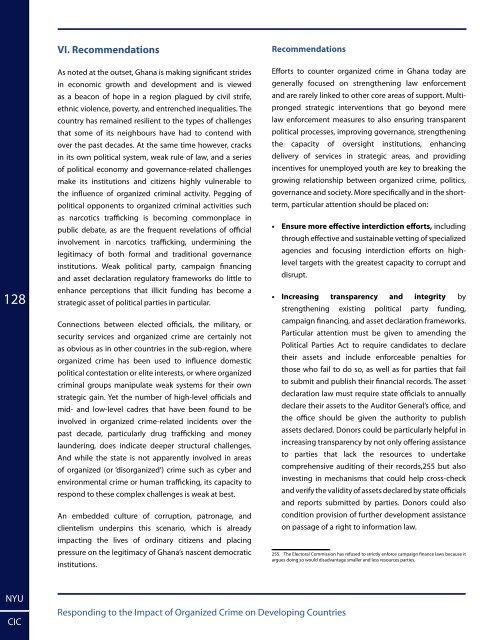here - Center on International Cooperation - New York University
here - Center on International Cooperation - New York University
here - Center on International Cooperation - New York University
Create successful ePaper yourself
Turn your PDF publications into a flip-book with our unique Google optimized e-Paper software.
128<br />
VI. Recommendati<strong>on</strong>s<br />
As noted at the outset, Ghana is making significant strides<br />
in ec<strong>on</strong>omic growth and development and is viewed<br />
as a beac<strong>on</strong> of hope in a regi<strong>on</strong> plagued by civil strife,<br />
ethnic violence, poverty, and entrenched inequalities. The<br />
country has remained resilient to the types of challenges<br />
that some of its neighbours have had to c<strong>on</strong>tend with<br />
over the past decades. At the same time however, cracks<br />
in its own political system, weak rule of law, and a series<br />
of political ec<strong>on</strong>omy and governance-related challenges<br />
make its instituti<strong>on</strong>s and citizens highly vulnerable to<br />
the influence of organized criminal activity. Pegging of<br />
political opp<strong>on</strong>ents to organized criminal activities such<br />
as narcotics trafficking is becoming comm<strong>on</strong>place in<br />
public debate, as are the frequent revelati<strong>on</strong>s of official<br />
involvement in narcotics trafficking, undermining the<br />
legitimacy of both formal and traditi<strong>on</strong>al governance<br />
instituti<strong>on</strong>s. Weak political party, campaign financing<br />
and asset declarati<strong>on</strong> regulatory frameworks do little to<br />
enhance percepti<strong>on</strong>s that illicit funding has become a<br />
strategic asset of political parties in particular.<br />
C<strong>on</strong>necti<strong>on</strong>s between elected officials, the military, or<br />
security services and organized crime are certainly not<br />
as obvious as in other countries in the sub-regi<strong>on</strong>, w<str<strong>on</strong>g>here</str<strong>on</strong>g><br />
organized crime has been used to influence domestic<br />
political c<strong>on</strong>testati<strong>on</strong> or elite interests, or w<str<strong>on</strong>g>here</str<strong>on</strong>g> organized<br />
criminal groups manipulate weak systems for their own<br />
strategic gain. Yet the number of high-level officials and<br />
mid- and low-level cadres that have been found to be<br />
involved in organized crime-related incidents over the<br />
past decade, particularly drug trafficking and m<strong>on</strong>ey<br />
laundering, does indicate deeper structural challenges.<br />
And while the state is not apparently involved in areas<br />
of organized (or ‘disorganized’) crime such as cyber and<br />
envir<strong>on</strong>mental crime or human trafficking, its capacity to<br />
resp<strong>on</strong>d to these complex challenges is weak at best.<br />
An embedded culture of corrupti<strong>on</strong>, patr<strong>on</strong>age, and<br />
clientelism underpins this scenario, which is already<br />
impacting the lives of ordinary citizens and placing<br />
pressure <strong>on</strong> the legitimacy of Ghana’s nascent democratic<br />
instituti<strong>on</strong>s.<br />
Recommendati<strong>on</strong>s<br />
Efforts to counter organized crime in Ghana today are<br />
generally focused <strong>on</strong> strengthening law enforcement<br />
and are rarely linked to other core areas of support. Multipr<strong>on</strong>ged<br />
strategic interventi<strong>on</strong>s that go bey<strong>on</strong>d mere<br />
law enforcement measures to also ensuring transparent<br />
political processes, improving governance, strengthening<br />
the capacity of oversight instituti<strong>on</strong>s, enhancing<br />
delivery of services in strategic areas, and providing<br />
incentives for unemployed youth are key to breaking the<br />
growing relati<strong>on</strong>ship between organized crime, politics,<br />
governance and society. More specifically and in the shortterm,<br />
particular attenti<strong>on</strong> should be placed <strong>on</strong>:<br />
• Ensure more effective interdicti<strong>on</strong> efforts, including<br />
through effective and sustainable vetting of specialized<br />
agencies and focusing interdicti<strong>on</strong> efforts <strong>on</strong> highlevel<br />
targets with the greatest capacity to corrupt and<br />
disrupt.<br />
• Increasing transparency and integrity by<br />
strengthening existing political party funding,<br />
campaign financing, and asset declarati<strong>on</strong> frameworks.<br />
Particular attenti<strong>on</strong> must be given to amending the<br />
Political Parties Act to require candidates to declare<br />
their assets and include enforceable penalties for<br />
those who fail to do so, as well as for parties that fail<br />
to submit and publish their financial records. The asset<br />
declarati<strong>on</strong> law must require state officials to annually<br />
declare their assets to the Auditor General’s office, and<br />
the office should be given the authority to publish<br />
assets declared. D<strong>on</strong>ors could be particularly helpful in<br />
increasing transparency by not <strong>on</strong>ly offering assistance<br />
to parties that lack the resources to undertake<br />
comprehensive auditing of their records,255 but also<br />
investing in mechanisms that could help cross-check<br />
and verify the validity of assets declared by state officials<br />
and reports submitted by parties. D<strong>on</strong>ors could also<br />
c<strong>on</strong>diti<strong>on</strong> provisi<strong>on</strong> of further development assistance<br />
<strong>on</strong> passage of a right to informati<strong>on</strong> law.<br />
255. The Electoral Commissi<strong>on</strong> has refused to strictly enforce campaign finance laws because it<br />
argues doing so would disadvantage smaller and less resources parties.<br />
NYU<br />
CIC<br />
Resp<strong>on</strong>ding to the Impact of Organized Crime <strong>on</strong> Developing Countries
















